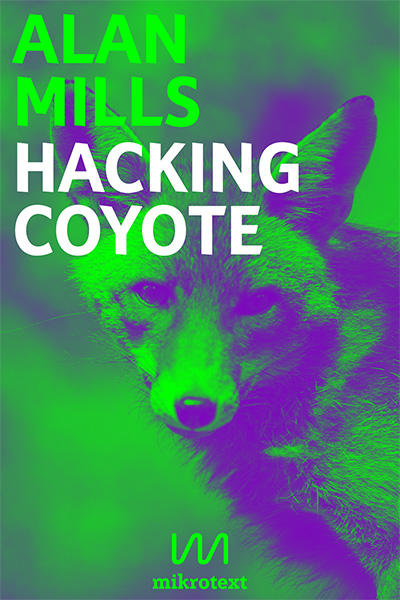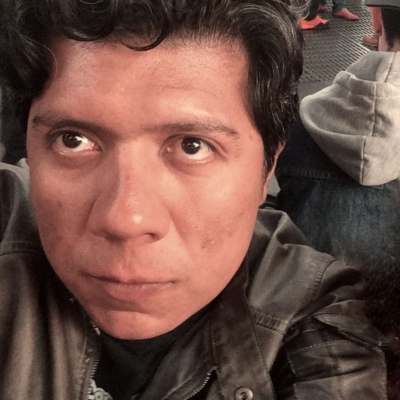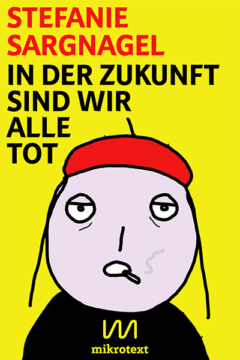Alan Mills
Hacking Coyote
Tricks for Digital Resistance

Thought-provoking essay on digital resistance, mixing Mayan knowledge, hacking theory and popular culture. Taking the coyote as the key figure for trickster philosophy.
4,99 €
„El guatemalteco Alan Mills escribe tanto novela en español como ensayo en inglés. Son transgénero, como todos nosotros.“
New York Times
„His chains of association are very daring in part. Like a conspiracy theorist. The essay is a thoroughly spiritual text, which is written in religious imagery.“
Enno Park, Kompressor/Deutschlandradio Kultur
„At times the author’s approach reminds me of Walter Benjamin’s essay on Surrealism, in which he not only explains and describes it but in which the linguistic presentation of the material itself carries a surrealist poeticalness that seems to lead in part to a non-rational knowledge.“
Eva Wißkirchen, comparaison d’etre
„This hacking essay is punk.“
Tania Folaji, Elektro vs. Print
Summary: Hacking Coyote
Good-bye, rational culture! Let Guatemalan writer Alan Mills welcome you to the philosophy of tricksters. Follow him on a tour through indigenous mythology, classical education, and the literary canon, thoroughly mixed with hacking theory and with popular culture—from Star Wars and Breaking Bad to familiar figures like Bugs Bunny and El Zorro.
Get to know Michael Jackson and David Bowie, Guy Fawkes and the Popol Vuh, the sacred book of the Maya-K’iche’, through this fulminant essay on old and new strategies for resisting superpowers. Mills currently lives in Berlin and Vienna, and Hacking Coyote is an expanded and elaborated version of his 2016 talk at Berlin’s biggest blogger convention, the re:publica TEN.
If you don’t yet know that the fox and the coyote can be read as symbols for destructive but simultaneously liberating deeds, if you haven’t yet learned to see them as transcultural trickster-hipsters, reading this poetic, associative and witty panorama will open your eyes. Or, in the author’s own words: “This open-source codex seeks to unite the contemporary traffickers of information with the smoke signals of their totemic animal.“
Also available in the US, the UK via well-known online shops.
Alan Mills was selected for the list Bogota39 of the most inspiring writers under the age of 39 from South America in 2017. #bogota39
Preface
We live in predatory times. We web users try to survive in the middle of a jungle, at times not so virtual, where hunters have intensified the stalking. Predators wearing the most varied cybernetic fur establish their monitoring circuits and extend their traps.
In both realms, the online world as well as in this outer space we call “reality”, it seems that the hunting ground of the most powerful has widened to a frenetic rhythm, inversely proportional to the reduction of not a few of our prerogatives as citizens.
Hunting plus virtual stockbreeding: we are read, mapped, monitored, reviewed, controlled, programmed, directed like numbered cattle that will go to the slaughterhouse when the time comes; we are herded like electrical sheep unable to perceive the presence of danger.
We are jumping inside a mental barn. At times it seems that we wear an electronic tag that prevents us from moving without supervision or without allowing our creativity, our cyber navigations and our searches to be milked by hungry economic and political powers.
Our private data, our content on social media, our moribund ability to get free access to information, our clicks, our virtual identities and, ultimately, the different interconnected regions of our lives, have been in recent years under the siege of mercenaries acting with military efficiency. Oriented towards a portentous profitability in dollars or euros, their huge jaws swallow our freedoms and our rights as if they were just a bunch of emoticons or small Pokémon.
Anyone can see that we wander blindly while we pick the most poisonous flowers in the garden of calamities. We have become the stuffed turkey of a dinner to which they pretend to have invited us. We thank them because we are getting polished like a cannon ball meant for a weapon pointing against ourselves.
We feel like we are selling ourselves down the raging river that flows into La Chingada. But something inside us whispers that not everything is lost yet. It’s getting down to the wire, folks, and yet we still have some small but vibrant hope, the cloud-figures in the sky indicate that a mischievous ancestral spirit wants to help us and hack the entangled network of this cyber war, the war for control of the Internet.
It’s not a bird, it’s not a plane, it’s the spirit of Coyote!
The spectral beast has sunk its claws into the World Wide Web and has been digging a system of tunnels between the parallel dimensions of reality, virtuality, fiction and myth, in order to dismantle—and at the same time, celebrate—the farce of a Cyberspace that in its best days could have become truly democratic. In these fateful moments an old master of knowledge has reappeared among us: one that is part animal, part human, a little like a ghost and, equally, a code that enlightens us, inspires us, guides us and advises us during this debacle. This mutant messenger offers its knowledge to address the distorted virtual mirror of a terrible material catastrophe.
Coyote wanders decoding, taunting, challenging the sinister cyber totalitarianism of our time, while simultaneously blowing into our faces, shamelessly enough, a gentle caress of smoke from his fine Cuban cigar.


